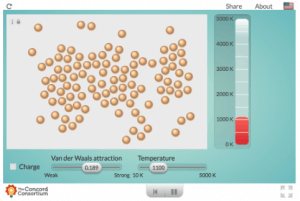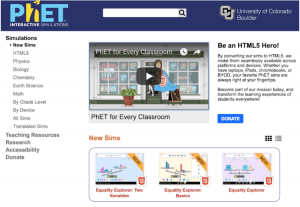Free interactive simulations can enhance STEM courses

Concept comprehension is a persistent problem in introductory science courses where the only time students can see concepts at work is during lab experiments. Digital interactive simulations are an innovative way to enhance student learning in STEM courses that present difficult concepts. Many of these simulations are available as free Open Educational Resources (OER) and can easily be incorporated into an existing course structure. With advances in accessibility to and innovations in technology, interactive simulations are emerging as powerful pedagogical tools to support learning in STEM courses.
Interactive simulations can expand student learning by providing a tangible way for them to interact with and understand difficult concepts. For example, trying to understand the effect of temperature on intermolecular interactions of atoms can be quite hard to visualize but with an OER such as Molecular Workbench the interactive simulation can effectively show the relationship between the strength of intermolecular interactions of atoms, like Van der Waals attraction, and the change in temperature. Even then the students might not understand what is occurring at the microscopic level. Interactive simulations can be replayed and parameters can be changed to produce different results leading to a greater understanding and comprehension of the concept. Interactive simulations provide an opportunity to make the invisible visible by bringing conceptual ideas to life.
Discover Resources
There is no one right way to find these resources but creating free accounts with digital libraries of OER (try OER Commons or Merlot) is a good way to get started. On these sites, you can browse by subject and content type (check out the “interactive” or “simulations” items) or do a direct search for “[subject/topic] interactive simulations”. Additionally, the sites provide reviews from previous users that can be helpful to understand how other teachers apply the simulations or if there are any problems. Also, check out Open Education @ UAF, which is a space for UAF faculty that focuses on how to find, evaluate the quality of, and incorporate OER.
The method of presenting and/or sharing these simulations will require some thought as well. Many of these can be embedded in your class website or just projected for the students to see in class. Here is a couple of high-quality STEM-related OER to get started:

- A decade of research and creating at the University of Colorado has produced high-quality simulations called PhET Simulations aimed at advancing science education. These simulations create an animated, interactive, game-like environment where students learn through active exploration. Backed by a multitude of peer-reviewed journal articles and teachers across the world, these simulations can be utilized in and/or out of the classroom to provide a student-led exploration of the chosen topics.
- The innovative, non-profit organization Concord Consortium created the Molecular Workbench and other OER that aim at inspiring student inquiry and data exploration, providing scientifically accurate virtual labs, and further developing teaching approaches based on analytics and feedback. The Molecular Workbench provides cutting-edge, high-quality interactives that bring difficult concepts to life.
Want to see open simulations in practice? Check out https://genchem.community.uaf.edu/ for sample modules that incorporate these tools.
References:
Perkins, K., Podolefsky, N., Lancaster, K. & Moore, E. (2012). Creating Effective Interactive Tools for Learning: Insights from the PhET Interactive Simulations Project. In T. Amiel & B. Wilson (Eds.), Proceedings of EdMedia 2012–World Conference on Educational Media and Technology (pp. 436-441). Denver, Colorado, USA: Association for the Advancement of Computing in Education (AACE). Retrieved August 10, 2018 from https://www.learntechlib.org/primary/p/40781/.
Next-Generation Molecular Workbench. (2017). Visual, Interactive Simulations for Teaching & Learning Science. Retrieved August 7, 2018. https://mw.concord.org/nextgen/#interactives/
Megan Roberts
Guest Author


